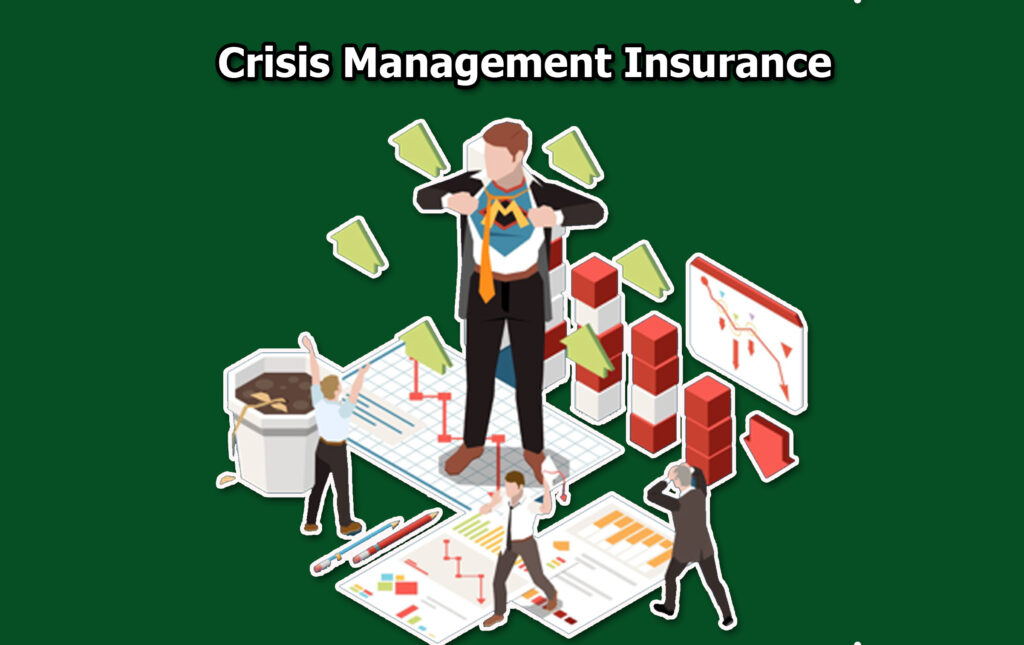What is crisis management insurance? In the world of business, there is a wide range of potential crises these institutions face, from product recalls and cyber attacks to public relations disasters and acts of terrorism.

Sadly, a single crisis can not only disrupt operations but also severely damage a company’s reputation and finances.
A primary solution to the many faces of this problem is the use of the Crisis Management Insurance. Crisis Management Insurance has emerged as a vital solution that provides businesses with both financial and strategic support when these unexpected events threaten to spiral out of control.
Furthermore, this specialized form of insurance is designed to help companies respond quickly and effectively to crises. What’s more, they function primarily to minimize potential damage and ensure continuity.
It doesn’t just offer financial reimbursement; it also includes access to expert guidance, media management, legal consultation, and other essential resources.
What Is Crisis Management Insurance?
Crisis Management Insurance is a specialized policy that provides coverage for the financial costs and professional support that a business may need during a crisis event.
Unlike traditional insurance policies, this model is not only focused on physical damages or losses but also includes coverage for intangible threats like brand damage and loss of consumer trust.
Some factors that this insurance mainly covers include:
- Cyber crisis response
- Reputation management
- Business interruption and recovery support
- Product recall expenses
- Legal and regulatory advisory services
- Public relations and media response costs
Whether it’s dealing with a contaminated food product, a data breach, or an executive scandal, the crisis management insurance ensures that a company is equipped to handle the incident promptly and professionally.
Benefits Of Crisis Management Insurance
Crisis management insurance offers more than just financial aid as it also provides peace of mind, timely intervention, and professional expertise.
Furthermore, these advantages can be very crucial in navigating high-pressure situations where every second counts. Some of their benefits include:
- Helps in managing public narratives to reduce long term damages
- From recall expenses to temporary shutdowns, the financial impact of a crisis can be severe. Crisis Management Insurance helps absorb these costs.
- In regulated industries, missteps can lead to hefty fines. So, legal advisors ensure compliance and help navigate investigations.
- Additional, these policies often include support for operational continuity and recovery planning.
- Most policies include partnerships with crisis management firms, legal advisors, and media consultants who can take swift action.
Types Of Crises Covered
Depending on your industry, the nature and frequency of threats may vary proving that not all crises are alike. The Crisis management insurance model can be tailored to cover a wide range of possible events.
Some of the common types of crises covered include:
- PR management for incidents involving key executives.
- Natural disasters or accidents when disasters disrupt business and impact public perception.
- Terrorism or sabotage especially relevant for companies operating in high-risk zones.
- Workplace violence or threats including coverage for counseling, legal actions, and reputation management.
- Product contamination especially important for food, pharmaceuticals, or cosmetics companies.
- Cyber security breaches which covers data leaks, ransomware attacks, and reputation fallout.
Who Needs Crisis Management Insurance?
Every business, regardless of size, faces risks that could quickly escalate into a crisis. However, certain industries are particularly vulnerable and may benefit most from this type of insurance.
Businesses That Often Need Crisis Insurance Include:
- Food and Beverage Companies
- Healthcare and Pharmaceuticals
- Tech and Financial Services
- Educational Institutions
- Manufacturers and Distributors
- Public Figures or Influencers (via individual policies)
What’s more, small businesses, which may not have in-house legal or PR teams, can especially benefit from the external support provided in such policies.
How To Choose The Right Crisis Management Insurance
The trademark of this insurance model lies in its customization and the breadth of its coverage. So, selecting the right provider and understanding the fine print are crucial. Here are things to consider when you are choosing a policy:
- Select a coverage that aligns with your most likely risks.
- Ensure the policy includes partnerships with leading crisis management consultants
- Confirm whether the policy covers both direct and indirect losses (like brand reputation).
- The quicker the intervention, the lower the impact of the crisis.
- Review any caps, limits, and situations that are not covered.
Frequently Asked Questions
Is The Crisis Management Insurance Only For Large Companies?
No. While large corporations are common buyers, small businesses also face reputation-damaging events. So, the crisis insurance can be tailored to suit any size of business.
What If I Already Have A PR Team?
Even if you have internal teams, crisis insurers often provide specialized firms experienced in rapid and sensitive crisis response that can supplement your current efforts.
How Much Does This Insurance Model Cost?
The costs vary widely depending on your industry, business size, and the risks you want to cover. Generally, policies can range from a few hundred to several thousand dollars annually.



